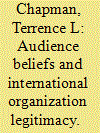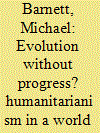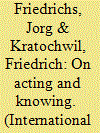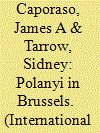|
|
|
Sort Order |
|
|
|
Items / Page
|
|
|
|
|
|
|
| Srl | Item |
| 1 |
ID:
092087


|
|
|
|
|
| Publication |
2009.
|
| Summary/Abstract |
Recent work suggests that multilateral security institutions, such as the UN Security Council, can influence foreign policy through public opinion. According to this view, authorization can increase public support for foreign policy, freeing domestic constraints. Governments that feel constrained by public opinion may thus alter their foreign policies to garner external authorization. These claims challenge traditional realist views about the role of international organizations in security affairs, which tend to focus on direct enforcement mechanisms and neglect indirect channels of influence. To examine these claims, this article investigates the first link in this causal chain-the effect of institutional statements on public opinion. Strategic information arguments, as opposed to arguments about the symbolic legitimacy of specific organizations or the procedural importance of consultation, posit that the effect of institutional statements on public opinion is conditional on public perceptions of member states' interests. This article tests this conditional relationship in the context of changes in presidential approval surrounding military disputes, using a measure of preference distance between the United States and veto-wielding members of the UN Security Council. Findings indicate that short-term changes in presidential approval surrounding the onset of military disputes in the United States between 1946 and 2001 have been significantly larger when accompanied by a positive resolution for a Security Council that is more distant in terms of foreign policy preferences. The article also discusses polling data during the 1990s and 2000s that support the strategic information perspective.
|
|
|
|
|
|
|
|
|
|
|
|
|
|
|
|
| 2 |
ID:
092083


|
|
|
|
|
| Publication |
2009.
|
| Summary/Abstract |
Many theories of international relations contain a narrative of progress and explain that progress with reference to evolutionary imagery. This article examines critically: the relevance of Darwinian and Lamarckian models of international relations to the evolution of international ethics and institutions; and the possibility that the ethics and norms are likely to be more consistent with existing world orders than challengers to it. Specifically, this article draws from evolutionary social science and organizational theory to develop a framework to explore the initial diversity of the meaning and practices of humanitarianism; how the combination of environmental mechanisms and organizational culture led many humanitarian agencies to adapt to their environment in ways that incorporated politics; and the subsequent countermovement by some agencies who wanted to purify humanitarianism. I then apply this framework to explain the recent history of four international aid agencies. I conclude with several observations regarding how the model as applied to these cases allows us to examine critically the selection mechanisms that do and do not account for ethical change and how scholars of international norms, ethics, and progress should be attentive to how principled actors are creatures of the world they want to transform.
|
|
|
|
|
|
|
|
|
|
|
|
|
|
|
|
| 3 |
ID:
092084


|
|
|
|
|
| Publication |
2009.
|
| Summary/Abstract |
This article explains a shift in the way transatlantic authorities managed conflicts over the cross-border regulation of securities markets: from cooperation skewed heavily toward the preferences of U.S. officials and accepted grudgingly by European counterparts; to a Euro-American regulatory condominium characterized by close interactions among decision makers and mutual accommodation. In the final decades of the twentieth century, the asymmetric influence wielded by U.S. securities market authorities had few parallels in other regulatory areas. Why, then, did U.S. officials become more accommodating and European authorities more influential, and why did the turning point occur in 2002 and 2003, an unlikely moment for intensified transatlantic sovereignty sharing? My study shows that institutional change inside the EU recast the North Atlantic balance of regulatory leverage and thereby was the primary factor behind the reshaping of transatlantic cooperation. Internal EU regulatory centralization changed the expectations of U.S. and European firms and authorities and generated new incentives in Washington, D.C., for accommodation and closer transatlantic coordination. My explanation differs from models that, accepting U.S. financial pre-eminence as a given, attribute variance in cross-border regulatory cooperation to factors such as incentives derived from the particularities of issue areas or preferences rooted in domestic politics. While resonating with a well-established theme from the realist branch of IPE, my findings have broad theoretical significance, and open new avenues for dialogue between realists and constructivists about the social, political, and institutional foundations of power in global economic affairs. The transatlantic political process set off by financial transformation in Europe reveals contemporary sources of systemic change and raises questions about what the EU's ascendance as a global financial regulator will mean in the aftermath of the late-2000s crisis.
|
|
|
|
|
|
|
|
|
|
|
|
|
|
|
|
| 4 |
ID:
092086


|
|
|
|
|
| Publication |
2009.
|
| Summary/Abstract |
This article moves from deconstruction to reconstruction in research methodology. It proposes pragmatism as a way to escape from epistemological deadlock. We first show that social scientists are mistaken in their hope to obtain warranted knowledge through traditional scientific methods. We then show that pragmatism has grown from tacit commonsense to an explicit item on the agenda of the international relations discipline. We suggest that a coherent pragmatic approach consists of two elements: the recognition of knowledge generation as a social and discursive activity, and the orientation of research toward the generation of useful knowledge. To offer a concrete example of what pragmatic methodology can look like, we propose the research strategy of abduction. We assess various forms of research design to further elucidate how pragmatic research works in practice.
|
|
|
|
|
|
|
|
|
|
|
|
|
|
|
|
| 5 |
ID:
092082


|
|
|
|
|
| Publication |
2009.
|
| Summary/Abstract |
Many have argued that the success of European integration is predicated on reinforcing market structures and some have gone further to state that the creation of a transnational market results in a decoupling of markets from their national political and social frameworks, thus threatening to unravel historical social bargains. Drawing on the work of Karl Polanyi and John Ruggie and using their insights regarding the social embedding of markets, we dissent from this view by examining how the European Court of Justice (ECJ) has handled a key sector of the emerging European market-labor mobility. We argue that rather than disembedding markets, decisions of the ECJ-just as Polanyi and Ruggie would have predicted-activate new social and political arrangements. We find evidence for the development of a new legal and political structure, largely inspired by the Court but also imbricated in European Union legislation, at the regional level.
|
|
|
|
|
|
|
|
|
|
|
|
|
|
|
|
|
|
|
|
|